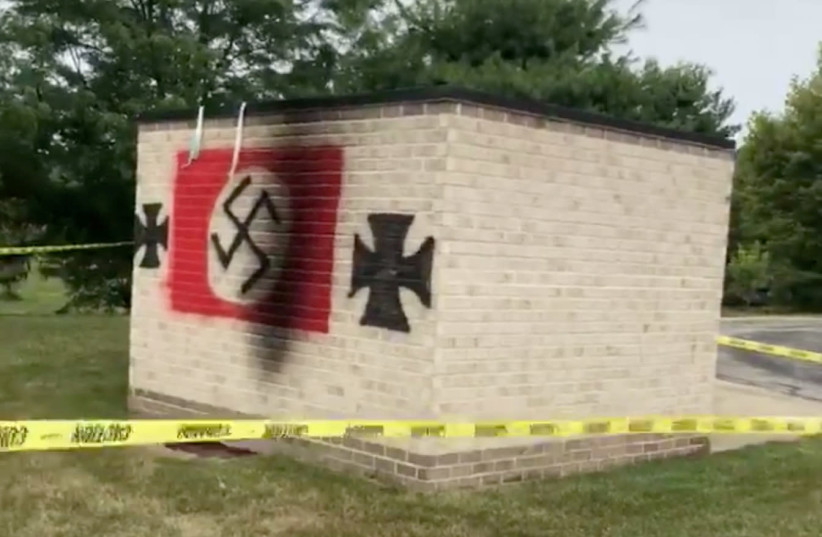(JTA) — A local school board candidate in a suburb of Indianapolis is drawing criticism for insisting that “not all Nazis were bad” and that teaching that they were would represent “indoctrination.”
Matt Keefer, an anesthesiologist who is running for school board in Zionsville, Indiana, initially made the comment in response to a Facebook user who pressed him for specifics about his platform, which starts with the statement, “Empower teachers to educate, not indoctrinate.” The user asked: Would teaching students that all Nazis are bad cross the line?
Keefer said it would. “All Nazis weren’t ‘bad’ as you specify. They did horrible things. They were in a group frenzy,” he wrote, adding, “Who is to say if we were both there in the same place and time, that we wouldn’t have done the same thing.”
Keefer doubled down Thursday night as reports of his comments, first collected by a local Twitter account and first reported by an Indianapolis TV station on Thursday, burst into public view. “A few days ago I made the comment ‘not all Nazis were bad’ in my response to a question posed to me on Facebook. I am correct,” Keefer wrote in a lengthy statement on Facebook. But he added, “To be clear: I never was, am not now, and never will be a Nazi sympathizer.”
“All Nazis weren’t ‘bad’ as you specify. They did horrible things. They were in a group frenzy,” he wrote, adding, “Who is to say if we were both there in the same place and time, that we wouldn’t have done the same thing.”
Matt Keefer
Keefer is one of five candidates for a single open school board seat and his election in November is hardly assured. Still, his candidacy is significant because it comes amid a national push by conservatives to elect people with his views to local school boards, where they can reshape what children are taught and the public discourse around education.

Keefer entered politics, he has said, because he was upset about pandemic restrictions and vaccine requirements, which he said one day might be perceived in hindsight as equally objectionable to Nazism. (Anti-vaxxers around the world have compared themselves to Jews during the Holocaust.) According to his platform, he opposes government mandates, emphasizes parental influence and condemns social and emotional learning and critical race theory, both of which have become flash points as conservatives seek to rid schools of progressive ideas about race and gender.
Keefer’s comments are not the first in which people who are part of the right-wing push to limit topics of race and gender in schools have made provocative comments about the Holocaust. An educator in Texas and an Indiana lawmaker are among those to have apologized after suggesting that teachers should remain “impartial” or offer multiple perspectives while teaching about the Holocaust, in keeping with their beliefs about how so-called “divisive topics” should be taught.
Holocaust literature removed from schools
Meanwhile, a graphic novel version of “The Diary of Anne Frank” and Art Spiegelman’s graphic Holocaust memoir “Maus” are among the books removed from schools amid a push to purge schools of texts that could expose them to inappropriate materials. (The vast majority of books removed have had themes about race or LGBTQ experiences.)
Several of Keefer’s competitors and Zionsville residents have publicly condemned his comments. “His defense of his statement is hurtful to many and should disturb everyone,” said one, Sarah Sampson, in a statement sent to WTHR, the local TV station. “In regards to his statement, ‘Who is to say if we were both there in the same place and same time that we wouldn’t have done the same thing?’ It is in times of chaos where our choices matter most, and where our true character shows.”
Bob Goodman, who is Jewish and owns a jewelry store in Zionsville, told WISH, another news station, that he thought Keefer’s comments were antisemitic and should be rebutted publicly.
“I just want to make sure people know what’s going on and what’s being said,” Goodman said. “I haven’t run into anybody to this point whose eyes haven’t bugged out of their head over it.”
Keefer declined to speak with the Jewish Telegraphic Agency, saying, “My response is posted on Facebook. It explains the original intent of a comment that some misunderstood.” His statement there permitted comments only by people who already followed him; all of the comments there Friday morning commended him.
